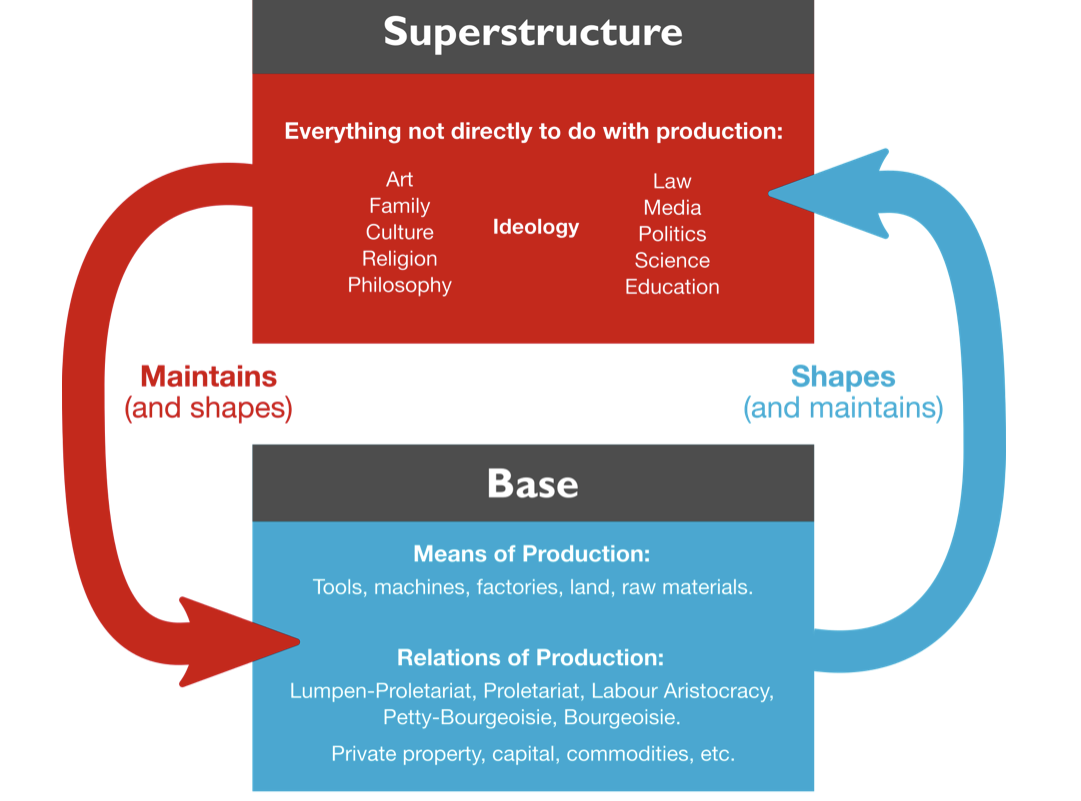Karl Marx's Game-Changing Marriage Advice

No, that’s not a typo.
We are actually writing a newsletter applying The 19th century German philosopher Karl Marx‘s philosophy of history to modern marriage.
Why on earth would we do such a thing? In spite of all the political baggage his "Manifesto of the Communist Party" brings, we believe that hidden deep within his theory of history lies an apolitical but profound insight about the challenges modern couples face.
At the risk of reducing the extreme complexity of Marx's theory of history into a couple paragraphs, here’s a quick summary of the idea we find so interesting.
Marx views the material and ideological structure of society like a two-layered wedding cake. The base layer consist of two elements: the relationship between those at the top and those at the bottom (relations of production) and the tools used to drive the economy (means of production).
His big claim is that these material arrangements and technologies shape everything that happens on the top layer of the cake. Marx calls this ideology. It's the mostly unconscious mindset that shapes our core beliefs about the world and each other. We tend to think that ideology changes societies and history. But Marx begs to differ. He views everything that happens up here as "superstructural," shaped by the deeper goings on of class relations and technological change.

What exactly does any of this have to do with marriage?
After years of doing this work, we've noticed that relationships display an eerily similar pattern.
Most couples focus on creating change at the top. They work on changing their attitudes, beliefs, and the way they talk to one another. To be sure, this is important work. But it often leads couples to ignore what's happening at the base layer: the deeper material relationships of money and power that shape the way they talk, act, and think.
And this leads us to the hard truth we keep encountering: until you address inequalities in power and money at the base layer of your relationship, it’s near impossible to solve the seemingly unrelated conflicts over who cares more, who’s doing more, or who’s trying harder.
These material structures, after all, shape much of what's happening in our minds.
How can you change these base-layer structures of money and power?
Tools
1. Follow the money.
In a society like ours, where wealth and power go hand-in-hand, the way you handle money as a couple creates your dynamic of power. So it can be helpful to take a closer look at how money flows in your relationship.
- Does one of you make more of it?
- Does one of you spend more of it?
- Does one of you control the way it is distributed and allocated?
- Do you share it?
- Do you talk about it?
- Do you have full transparency around it?
These questions may sound obvious but many couples avoid ever asking them.
2. Redesign your structure.
If you uncover inequalities at the base of your relationship, it’s worth considering ways to redesign the economics of your household to balance out these asymmetries in power.
For instance, if one of you has full visibility into your finances and the other doesn’t, consider creating a regular finance meeting where you talk through your spending, your budget, your savings, your investments, and big purchases.
If one of you consistently spends more than the other, consider working together to create a family budget that you agreed to in advance.
If one of you keeps trying to control the spending habits of the other, consider creating “side stash" accounts that auto-withdrawal each month into separate personal accounts, accounts that you can each spend without the oversight or criticism of the other person.
For more strategies and tools, check out the Power chapter of The 80/80 Marriage.
3. Get outside help.
For some couples, the DIY approach to balancing out money and power works. For others, however, it can lead to even greater tension and conflict.
So if your conversations about money and power make things worse instead of better, it’s worth seeking the help of a marriage therapist or relationship coach. We have worked with couples to help them navigate this very issue. And we have found that having an impartial third-party is often essential when it comes to redesigning these delicate and emotionally-charged structures that make up the very foundation of married life.
Want more of these life tools delivered to your inbox?
Sign up for the Klemp Insights Newsletter.

